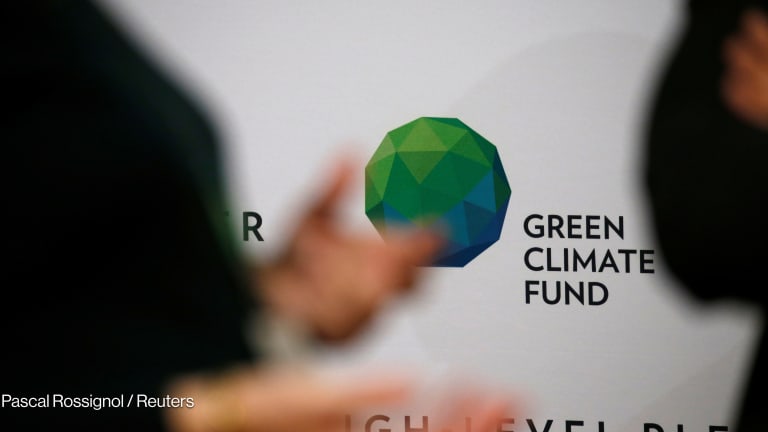How to access the UN's Green Climate Fund
In response to criticism over its lengthy accreditation process, the Green Climate Fund has rolled out a simplified approvals process. Here's what you need to know about the new initiative.
MANILA — Since the United Nation’s Green Climate Fund became operational three years ago, the world’s largest international climate fund has struggled with accusations that its accreditation process is too cumbersome, bureaucratic, and difficult to maneuver — especially for the under-resourced developing countries that it is mandated to prioritize. Kilaparti Ramakrishna, director ad interim of external affairs at GCF, told Devex that “the accreditation process is there for a reason, but we recognize the time it takes to complete that, and then channeling projects after becomes a very long, drawn-out process.” “We want to see action on the ground,” he stated. GCF is taking steps to make accessing the fund easier through initiatives such as the simplified approvals process, or SAP. Through SAP Documentation and review process Launched at the 23rd conference of the parties under the U.N. Framework Convention on Climate Change in Bonn, Germany, last November, the simplified approval process pilot scheme aims to streamline and simplify applications for select small-scale projects of up to $10 million in GCF funding. It is aimed particularly at supporting project proposals from direct access entities — which are national groups in developing countries through which climate finance can be channeled directly — as opposed to being coursed through international accredited entities such as the Asian Development Bank. Just a few months after the initiative was introduced, the first project proposal under SAP was approved at GCF’s February board meeting. At the event, Namibia was granted $9.3 million to improve rangeland and ecosystem management practices of smallholder farmers under climate change. It was the first time that the country submitted the project to GCF — under any process. It took about three months after the entity submitted its concept note for the resulting project proposal to receive board approval. Admittedly, it is difficult to tell how long a standard funding proposal would take to be approved — if at all — simply because there are so many variables involved. But, GCF’s Ramakrishna insists that “SAP represents a very big advance.” Currently, SAP is in its pilot phase and the board approval process remains the same for SAP and full funding proposals. The simplification occurs earlier on, particularly during the concept note stage, which is the first official step most developing countries take in accessing GCF funding. Under SAP, this stage is meant to be more straightforward, with lighter documentation, and a streamlined review process before the proposal is presented to the board. And since SAP only applies to minimum to no-risk projects, the screening for environmental and social safeguards is also meant to be more simple. Aside from the documentation and review process, the biggest difference with SAP might have to do with decision making, Ramakrishna said. Decision making Project proposals are currently only approved during board meetings, which occur every three to four months. But GCF is considering allowing SAP proposals to be approved in between board meetings, which would significantly speed up the process. As of December 2017, eight project concepts under SAP are in the pipeline. But civil society groups warn observers not to get too excited just yet. “The template [for SAP] is a bit shorter, but you still have to submit supplementary documents and still have to answer a lot of questions so I would say that right now we really have to see what SAP actually delivers in the end,” said David Eckstein, policy adviser for climate finance and investments at nonprofit Germanwatch, which is tracking SAP. Eckstein is also concerned that at most, $80 million of GCF financing — or less than 1 percent of the fund’s total budget — has been set aside for SAP approvals before a review of the entire process is to be conducted. “We would have liked to see a bit more [money], just to be able to generate more lessons and then change things so [that SAP] is more fit for purpose,” Eckstein said. While SAP is meant to speed up project implementation by making it easier to submit small project proposals, it is important to note that the process has no bearing on disbursals, which remain a chronic challenge for GCF. Part of the difficulty is that disbursals largely depend on the accredited entity that put forward the proposal, and the variation between one entity and the next is enormous. “For the same amount of money, one accredited entity moves very rapidly while the other could take a year and a half,” said Ramakrishna. “I’m not saying the same would be true of SAP, but if it is, I wouldn’t be too surprised.” Other ways forward Request for proposals SAP isn’t the only way GCF is looking to make it easier for developing countries to access funding for climate change projects. In May 2017, GCF announced that it was offering $500 million to unlock private sector finance in developing countries with an emphasis on micro, small, and medium enterprises. The request for proposals, better known as RFP, resulted in over 350 submissions, out of which 30 were shortlisted and are being developed into full funding proposals. These include a green finance fund put forward by the Australian investment bank Macquarie Group, designed to demonstrate the viability and impact of local green finance institutions to national governments in Southeast Asia. In an interview with Devex last December, Ewen McDonald, who at the time was GCF co-chair and is currently the fund’s Australian board member, said that RFP is important because of the sheer number of good ideas that they attract. “Otherwise you just end up going to the same people, the same accredited entities, some of which, will be very familiar to you,” he said. McDonald went on to explain that a lot of the “paradigm shifting” that the fund aims to promote comes from the type of projects that the board endorses. He hopes that the creative projects submitted under the open RFP will inspire others to think outside the box. However, before the shortlisted proposals are brought to the GCF board for consideration, the organization submitting the project needs to go through the fund’s accreditation process, which some have successfully completed. Or they can partner with an accredited entity. For those seeking accreditation, it is important to note that the GCF secretariat and board are currently reviewing the fund’s accreditation framework, and will be delving further into possible paths forward at GCF’s next board meeting in July. Some ideas to look out for include the prospect of project-level accreditation, which has been circulating around the climate change community for a while now but was only considered for the first time by the board at its meeting last March. At the event, a paper on project-level accreditation was submitted, stated that as a pilot, it would only apply to certain projects, namely those covered by SAP and RFP for enhanced direct access; mobilizing funds at scale; and supporting micro, small, and medium enterprises. RFP especially lend themselves well to project-level accreditation since the entity putting forward the proposal is likely to only recommend one, although a limit of three projects per entity has been proposed under this approach. Theoretically, the assessment for project-level accreditation would focus on the organization’s ability to implement the proposed project in accordance with GCF requirements, rather than an assessment of the entity’s overarching systems, policies, and procedures, as would normally occur. Also, creating an avenue for institutions seeking to work with GCF in a limited way would help to unclog the accreditation pipeline, thus enabling the accreditation process to focus on institutions that intend to serve as long-term partners of the fund. Another option under consideration is enabling “accreditation with associated partners.” This approach could work best for organizations that are strong when it comes to fiduciary, environmental, social, or gender aspects, but may not have the necessary institutional systems, policies, or procedures in place to satisfy all of GCF’s requirements. Under this approach, an organization could seek accreditation by partnering with other complementary organizations to fill any institutional gaps. Moving forward, GCF has contracted an independent consulting firm to conduct a full independent review of the fund’s accreditation process, which will ideally factor into GCF’s July board meeting. Any changes ultimately made will be a real balancing act for all stakeholders involved. “There are a lot of ideas that we’re trying to look at, but we want to be careful and ensure that as we put these ideas together, we aren’t compromising any of the core principles that a donor can expect us to comply with,” said Ramakrishna.
MANILA — Since the United Nation’s Green Climate Fund became operational three years ago, the world’s largest international climate fund has struggled with accusations that its accreditation process is too cumbersome, bureaucratic, and difficult to maneuver — especially for the under-resourced developing countries that it is mandated to prioritize.
Kilaparti Ramakrishna, director ad interim of external affairs at GCF, told Devex that “the accreditation process is there for a reason, but we recognize the time it takes to complete that, and then channeling projects after becomes a very long, drawn-out process.”
“We want to see action on the ground,” he stated.
This story is forDevex Promembers
Unlock this story now with a 15-day free trial of Devex Pro.
With a Devex Pro subscription you'll get access to deeper analysis and exclusive insights from our reporters and analysts.
Start my free trialRequest a group subscription Printing articles to share with others is a breach of our terms and conditions and copyright policy. Please use the sharing options on the left side of the article. Devex Pro members may share up to 10 articles per month using the Pro share tool ( ).
Fatima Arkin is a Devex contributor specializing in climate change, human rights, and sustainable development. She has reported across Asia, Africa, Europe, and North America for Foreign Policy, SciDev.net, Maclean's, and many others. She holds a B.A. in international development and history from McGill University and a graduate diploma in journalism from Concordia University, both located in Montreal, Canada.








